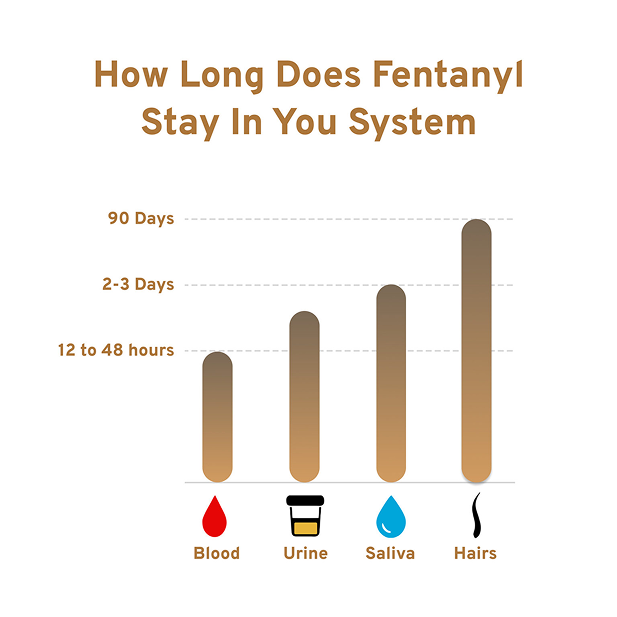It’s late at night, and you’re staring at your screen, heart racing as you type: “How long does fentanyl stay in your system?” Maybe you’ve taken it yourself. Maybe you’re worried about a loved one. Either way, the question isn’t just about passing a drug test, it’s about safety, health, and peace of mind.
Let’s walk through this together. We’ll break down how long fentanyl lasts in the body, how it’s detected, and why this answer matters more than you might think.
Many people search this question right before a drug test, but others type it in because they’re afraid of the health effects. The truth is, the amount of time fentanyl stays in your system can mean the difference between safety and serious medical complications. That’s why understanding this timeline isn’t just about science — it’s about protecting your body and your future
What Makes Fentanyl Different?
Fentanyl isn’t just another painkiller. It’s 50–100 times more potent than morphine, which means even a tiny amount can have huge effects. That’s why it’s prescribed in hospitals for severe pain but has also become one of the most dangerous drugs on the street.
Here’s the catch: fentanyl leaves the feeling of your body faster than it leaves the traces. So while the “high” may fade in a few hours, tests can still pick it up days later.
💡Fun Fact: Did you know fentanyl was first developed in the 1960s for surgical pain relief? Doctors back then never imagined it would one day drive a public health crisis.
Today, illicit fentanyl is often mixed into street drugs like heroin, cocaine, or counterfeit pills without the user even knowing. This makes the question of fentanyl stays in your system even scarier, because many people don’t realize they’ve consumed fentanyl until it shows up in a test or until they experience an overdose.
How Long Does Fentanyl Last in the Body?
- Effects: Usually felt within minutes, lasting 30 minutes to 2 hours.
- Half-life: About 7 hours — meaning it takes 7 hours for half of the drug to leave your system. But it takes about 35 hours (5 half-lives) to clear most of it.
- Lingering traces: Your body may keep breaking down metabolites even longer, especially if you’ve used fentanyl more than once.
Think of it like caffeine: some people drink a cup of coffee and feel jittery for hours, while others barely notice. Fentanyl works the same way, your body’s chemistry changes the timeline. Fentanyl is a prescription opioid used to treat moderate to severe pain.
It’s also important to remember that just because you no longer feel the effects doesn’t mean your body is free of fentanyl.
Think of it like alcohol: you may feel sober a few hours after drinking, but a breathalyzer can still detect it.
The same principle applies here, fentanyl lingers beyond what you can “feel,” which is why so many people are caught off guard during drug screenings or medical tests.
How Long Does Fentanyl Stay in Your System by Test
Urine Testing for fentanyl:
Urine tests are the most common and reliable way to detect fentanyl. For occasional use, it may show up for 1–3 days, but for regular or heavy users, it can last a week or more. Because urine testing is widely used in workplaces, treatment centers, and legal cases.
Blood Testing for fentanyl:
Blood tests detect fentanyl quickly, usually within 5–48 hours after use. They’re often used in emergency rooms when doctors need immediate answers about recent drug use. While the window is shorter, it’s crucial for spotting active fentanyl in the body, especially during overdoses.
Saliva Testing for fentanyl:
Saliva tests can sometimes detect fentanyl for up to 2 days, but they’re less reliable than urine or blood. Because fentanyl is so potent, tiny amounts may not always appear in oral fluid, making saliva tests more useful for short-term detection than long-term monitoring.
Hair Testing for fentanyl:
Hair tests provide the longest detection window, up to 90 days. A small hair strand can reveal patterns of fentanyl use over weeks or even months. While less common in workplaces, hair testing is often used in court cases, custody battles, or rehab assessments because it shows the bigger picture of someone’s history.

Factors that affect the duration of fentanyl in your system
Everyone’s body is different. These factors matter:
- Frequency of use → daily users may test positive longer.
- Dosage → higher doses stick around.
- Method → patches release slower than injections.
- Weight & metabolism → slower metabolism = slower clearance.
Liver/kidney health → your body’s “filters” affect how long fentanyl lingers.
Another overlooked factor is drug interactions. If you’re taking medications such as antifungals, antibiotics, or HIV treatments, they can change the way your liver processes fentanyl, either speeding up or slowing down clearance.
Similarly, combining fentanyl with alcohol or benzodiazepines doesn’t just increase overdose risk, it may also affect how long traces remain detectable in your system.
Helpful Tip: Staying hydrated and taking care of your liver health (by avoiding alcohol and eating well) supports your body’s detox process but it doesn’t erase fentanyl quickly. Time is still the biggest factor.
On the flip side, unhealthy habits like smoking, poor diet, or dehydration can put more stress on the liver and kidneys, slowing down detox. That’s why lifestyle makes such a difference in drug clearance.
While you can’t “hack” your body to remove fentanyl instantly, supporting your natural detox organs does improve your overall health and resilience if you’re in recovery.
The Hidden Truth: Norfentanyl & Lingering Risks of fentanyl
Here’s what most blogs don’t tell you: your body doesn’t just break down fentanyl and throw it away. It creates a metabolite called norfentanyl, which can linger in fat tissue and sometimes even re-enter the bloodstream later.
This is one reason fentanyl overdoses can still happen even after the “high” is gone. Your body is holding onto more than you think.
This is especially important for people who use fentanyl repeatedly. Even if you stop, norfentanyl can still show up in tests days later, sometimes longer than expected. And because fentanyl is lipophilic (fat-loving), people with higher body fat percentages may carry these metabolites for extended periods.
That’s part of why timelines aren’t universal, your personal biology changes the rules. That’s why individualized detox and recovery plans, like those offered fentanyl addiction treatment in Florida, are so important.
Fentanyl Detection is more Than Just a Drug Test
For many people, the main worry is whether fentanyl shows up on a drug screen. But this question runs deeper:
- Overdose risk: Even small traces can be dangerous, especially if mixed with alcohol or other drugs.
- Withdrawal: Once fentanyl leaves your system, withdrawal symptoms (sweating, nausea, anxiety) may kick in.
- Peace of mind: If you’re here searching, chances are you’re already carrying worry. That in itself is heavy.
For families and loved ones, the timeline matters too. If you suspect someone close to you has been using fentanyl, knowing the detection windows can help you understand recent behavior, plan for safe conversations, or encourage them to seek treatment.
It’s not just about catching use, it’s about offering support before things spiral further.
If you’re searching for answers, Drugs Rehab Center in Florida offers guidance and resources to help you support someone struggling with fentanyl safely.”
Fun Fact: The human liver processes more than 500 vital functions every day — from breaking down drugs to helping fight infections. It’s basically the unsung hero of detox.
Another surprising fact? Hair testing doesn’t just Detect fentanyl, it can reveal patterns of drug use over time. A 2-inch sample of hair can show approximately 60 days of history.
That’s why hair tests are sometimes used in legal cases, custody battles, or workplace settings. It shows a long-term picture, not just a snapshot.
Why Asking About Fentanyl in Your System Can Be the First Step to Healing
Recovery isn’t a one-size-fits-all journey. Some people take small steps like talking to a counselor; others enter inpatient or outpatient detox programs. What matters most is that you move forward at your own pace, with the right support.
The question “How long does fentanyl stay in your system?” is often the first sign someone is ready to take back control. If you’re here, reading this right now, you’re already closer to change than you realize.
You Don’t Have to Do This Alone
Every day, people take the first step toward safety and peace of mind. And you can too
How long does fentanyl stay in urine?
Usually 1–3 days, depending on use.
Can fentanyl show up in a hair test?
Yes. Hair tests can detect fentanyl for up to 90 days.
Does fentanyl leave faster if I drink water or exercise?
Not really. Healthy habits support detox, but your body still needs time.
What’s the shortest detection time?
Blood tests may only detect fentanyl for 5–12 hours in some people.
Why does fentanyl stay longer in some people than others?
It depends on your dose, metabolism, body fat, and organ health.


